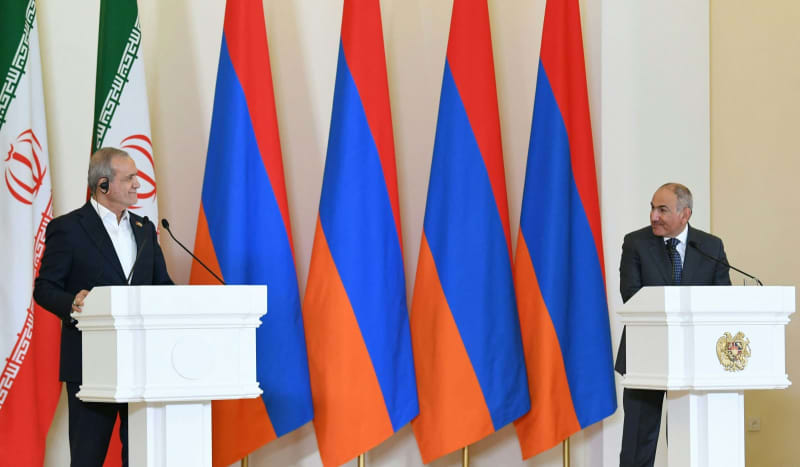Baku’s Jews called the deal a “blow to Iran,” while US communities praised it as strengthening stability and aiding Israel.
Iranian President Masoud Pezeshkian warned that “rule in the Caucasus must remain Caucasian” and voiced concern about American involvement. Armenian Prime Minister Nikol Pashinyan stressed that control of the corridor would remain under Armenia.
In Baku’s Jewish community, the deal was described as “a blow to Iran,” while Jewish communities in the United States praised it as a step that strengthens regional stability and supports Israel.
Pezeshkian arrived in Yerevan this week for his first official visit, just days after the historic peace agreement between Armenia and Azerbaijan was signed at the White House.
The August 8 agreement, attended by US President Donald Trump, includes the opening of key transportation routes, among them the TRIPP corridor linking Azerbaijan with the Nakhchivan enclave through southern Armenia. This route bypasses Iran and its ally Russia, which had long exploited the Yerevan-Baku conflict to strengthen their economic standing in the resource-rich region.
As part of the project, American companies plan to lease significant areas of Armenian land along the border with Iran. This move is expected to block Tehran from transferring sanctioned goods across the Armenian border without oversight, as it had done in the past. It also deals a blow to Iran’s nuclear program, which already suffered from Israeli and American strikes in June.

US President Donald Trump holds the hands of Azerbaijan’s President Ilham Aliyev and Armenia’s Prime Minister Nikol Pashinyan as they shake hands between each other during a trilateral signing event, at the White House, August 8, 2025. (credit: REUTERS/KEVIN LAMARQUE)
The European Union welcomed the peace deal, while Russia called it “a positive step for stability in the Caucasus.” In Tehran, however, harsh warnings were issued.
A senior adviser to Iran’s supreme leader cautioned that the corridor could become “a graveyard for Trump’s mercenaries.” Iran is deeply concerned that the reconciliation between Baku – a key ally of Israel and apparently also of Washington – and Armenia, once almost an Iranian satellite, will undermine its influence in the region.
According to Armenian media reports, Pezeshkian reiterated that “rule in the Caucasus must remain Caucasian” and argued that handing issues over to external actors “complicates an already sensitive situation.”
Pashinyan responded that “the roads running through Armenian territory will remain under Armenia’s exclusive jurisdiction, and security will be provided by Armenia, not by a third country.” During the visit, the two sides also signed agreements on economic, cultural, and infrastructure cooperation.
Iran strongly criticizes Armenia-Azerbaijan accord
Iranian state media in recent weeks strongly criticized the peace agreement, continuing a campaign of attacks against Azerbaijan for its strategic partnership with Israel. Baku is regularly branded “a base for Zionists and NATO,” with claims that the commercial corridor will serve Israel and the United States and “disrupt the balance in the region,” since Jerusalem and Washington are considered “foreign to the area.”
Rabbi Zamir Isayev, the Sephardi chief rabbi of Baku, welcomed the agreement, saying it “sends a clear message of peace and unity and strengthens the region’s ability to resist Iranian influence. It is no surprise that Iran fears this deal.”
Jewish communities in the United States also praised the development, calling it “a step that strengthens stability in the Caucasus, brings Armenia closer to the West, supports Israel’s security and that of its ally Azerbaijan, and reinforces the resilience of Jewish communities in the region and abroad.”
